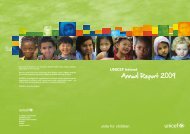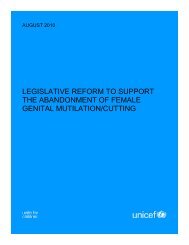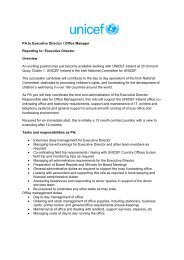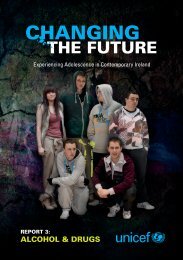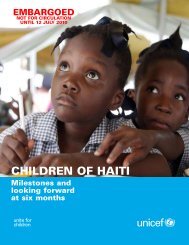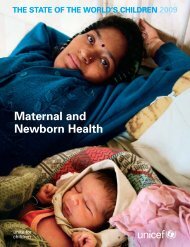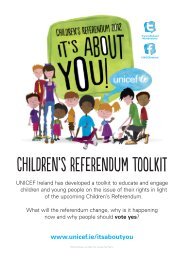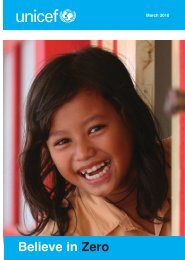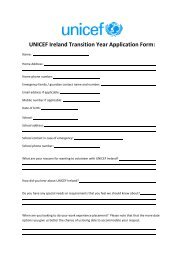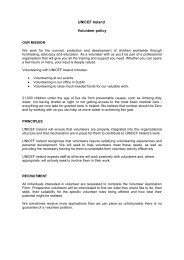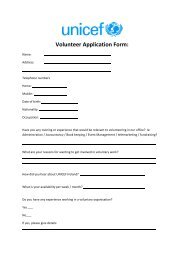Humanitarian Action for Children 2011 - Unicef
Humanitarian Action for Children 2011 - Unicef
Humanitarian Action for Children 2011 - Unicef
- No tags were found...
You also want an ePaper? Increase the reach of your titles
YUMPU automatically turns print PDFs into web optimized ePapers that Google loves.
Haiti<strong>Humanitarian</strong>funding at work:Highlights from 2010In the immediate aftermathof the disaster, UNICEFappealed <strong>for</strong> US$222,757,000,adding US$127,243,000 inrequirements through the<strong>Humanitarian</strong> <strong>Action</strong> Report(HAR) over a two-yeartimeframe. As of October,US$66,992,052 had beenreceived against the HAR.With the generous funding ofdonors, UNICEF and partnerswere able to reach morethan 1.9 million childrenwith immunizations andclose to 1.8 million peoplewith basic health servicesthrough the distributionof 177 emergency kits tohealth-care facilities. Over11,250 children with severeacute malnutrition receivedlife-saving treatment in oneof 159 outpatient therapeuticfeeding programmes or 28stabilization centres set upafter the earthquake. Over678,000 people had accessto safe drinking water viatrucking in the early recoveryphase, and the installation of8,900 latrines gave over 1.1million access to emergencysanitation. More than 4,000separated children wereregistered, and over 1,000were reunited with family,with the rest accommodatedin safe temporary care.<strong>Children</strong> and women in crisisThe situation <strong>for</strong> women and children in Haiti was defined in 2010 by catastrophic emergenciesthat raised extreme challenges <strong>for</strong> the population. The earthquake on 12 January killed morethan 220,000 people and displaced 2.3 million. An estimated 1 million people, including 400,000children, are still living in crowded temporary settlements that elevate health and protectionrisks. Flooding caused by Hurricane Tomas in early November resulted in additional deaths,temporary displacement and aggravated food insecurity. By 15 December, a cholera epidemichad sickened over 117,580 people and caused the deaths of 2,481 people, including 169 childrenunder 5. The impact of these crises was particularly severe due to the already deep vulnerabilityof children; the major emergencies further exacerbated food insecurity, degraded water andsanitation infrastructure, elevated protection risks <strong>for</strong> children, decimated the school systemand led to disruptions in a weak health sector. When cholera emerged in the rural Artiboniteregion, it rapidly gained a foothold and spread nationwide, confirming that stark disparities inaccess to social services across the country represent a real and pressing threat to the healthand stability of the nation as well as a denial of children’s basic rights. The humanitarianmission rapidly introduced life-saving services and interventions designed to meet basic needsof earthquake- and cholera-affected children – but the challenge is ensuring that these servicesare decentralized and firmly rooted in sustainable community-based structures.Meeting urgent needs and building resilience in <strong>2011</strong>UNICEF will provide leadership <strong>for</strong> the WASH, education and protection clusters in Haiti during<strong>2011</strong> and will continue to work with the Government of Haiti, other UN agencies and NGOs.• At least 2.5 million people at high risk of cholera infection will have access to safe drinkingwater as a result of improved surveillance and treatment. More than 9 million will be reachedwith health and hygiene messages designed to prevent the spread of cholera.• Up to 3 million people will receive preventive and curative health services, with crucialsupplies distributed and costs supported <strong>for</strong> facilities including cholera treatment centres andoral rehydration points. UNICEF will help nurses, auxiliary health-centre staff and communityhealth workers improve their ability to recognize and manage cholera cases.• 10,000 children 0–59 months old who are suffering from severe acute malnutrition (30 percent of all those in need) will be treated with timely, quality care. Fifty thousand pregnantwomen – 17 per cent of all pregnant women in Haiti – will have increased knowledge oninfant feeding, nutrition and cholera prevention.• Around 90,000 children will benefit from the construction of 100 additional semi-permanentschools in earthquake-affected or marginalized areas.• More than 500,000 earthquake-affected and other extremely vulnerable children and 20,000women at risk or survivors of violence will benefit from protection and essential services,including HIV-related prevention, care, support and treatment.Funding requirements <strong>for</strong> <strong>2011</strong>In <strong>2011</strong>, UNICEF is requesting US$156,967,000 <strong>for</strong> its humanitarian work in Haiti. Thisrequest exceeds the Consolidated Appeals Process (CAP) requirements because it includescommitments related to the expanded cholera response. Immediate and adequate funding isneeded to avoid further degradation of the humanitarian situation in Haiti, and to build on theresilience already demonstrated by the country’s women and children.More in<strong>for</strong>mation on 2010 achievements and details of the humanitarian actionplans <strong>for</strong> Haiti can be found at www.unicef.org/hac<strong>2011</strong> and the country office websiteat www.unicef.org/haiti (French).UNICEF EMERGENCY NEEDS FOR <strong>2011</strong> (in US dollars)Total $156,967,00033,169,000 Health23,912,000Child protection10,000,000Cross-sectoral19,653,000 Nutrition39,463,000 WASH20,390,000Education10,380,000Cluster coordination58 <strong>2011</strong> UNICEF <strong>Humanitarian</strong> <strong>Action</strong> FOR CHILDREN | www.unicef.org/hac<strong>2011</strong>Haiti




